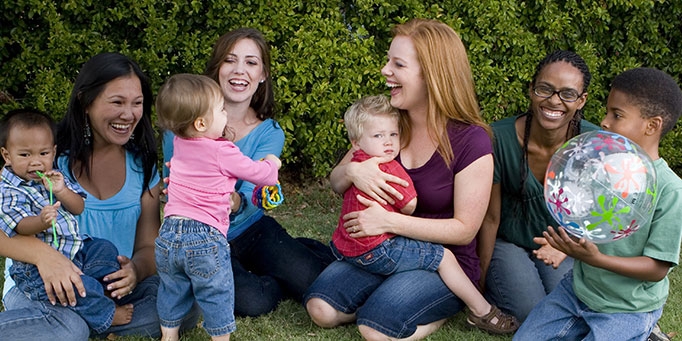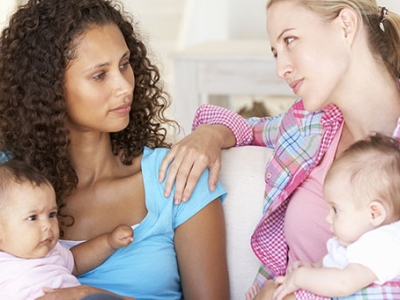
Making peace in the parenting wars
How can we relate when our parenting styles are so different?
When I was in my 20s, I studied and lived at Bible college. Some of the married students also lived on campus together with their whole family. I once commented to one of the wives that it must be so wonderful to have other Christian mums and kids around during the day. But her reply left me in shock. She said that there was actually a noticeable division between the college families—some families intentionally avoided spending time together. So what was it that had driven a wedge between these Christian families? Was it a difference of doctrines or denomination? No—it was their differing parenting styles. And I’m sure that this story is all too common.
So how can we build positive relationships with other Christian parents, when our parenting styles can be so different?
It’s a journey
The fact is that our parenting style usually grows and matures with time. We all start out as anxious and overprotective ‘first-time parents’. But as time goes on, we gain confidence in our parenting through experience and observation. We refine our approach through trial and error. By the time we have our second or third child we have usually become more relaxed and self-assured. Parenting is just one of those skills you have to learn on the job.
So when we encounter someone with a different parenting style to us, it may be that they are still finding their feet. Maybe they just haven’t had the chance to learn all of the lessons that we have learnt. We need to allow other parents time to mature in their parenting, like we have done.
I find this is a helpful starting point for conversations—I can usually empathise with where other parents are at in their parenting journey. By acknowledging that we are all improving as we go, I can humbly share the things I have learnt along the way.
Asking why
When we avoid talking to parents with different parenting styles, we miss out on the opportunity to learn from each other. We often assume the worst, without really understanding someone else’s parenting philosophy. A good strategy is to ask questions, rather than make assumptions. When we give someone the chance to explain why they do things a certain way, it can give us a fresh perspective and a deeper respect for their approach.
By asking questions, I have learnt about some very interesting parenting philosophies over the years: why some parents don’t allow fantasy play; why some parents won’t help their children on the play equipment; why some parents give their children real tools; why some parents don’t believe in Sunday school; why some parents teach their children Latin. If you come across someone with an interesting or surprising parenting practice, ask them why! You never know what you might learn.
And if we know the 'why', then we can explain it to our children when they notice that other families have different rules or habits to theirs.
The middle ground
When we think about different parenting styles, our minds automatically jump to the extreme ends of the spectrum—attachment parenting versus strict routines; permissive parents versus disciplinarians, ‘free range’ versus ‘helicopter’ parents. But the reality is that most of us are trying to find our place somewhere in the middle.
We are all trying to balance grace and ‘law’, understanding and discipline, protection and independence.
A question of how and when
If we stop and really listen to other Christian parents, I think we’ll find that we’re generally aiming for much the same thing. We all want our children to grow into confident, emotionally mature, self-disciplined, respectful, honest, helpful, hard-working, creative—and Christian!—adults. We all want our children to become capable in the skills they will need for life and faith. We just disagree on how—or when—they will get there.
All children are gradually moving from dependence to independence in different aspects of their lives; as parents we are helping them move towards maturity. And when you look at some of the most hotly debated parenting issues, the different ‘camps’ simply locate children further up or down the scale of dependence on that particular issue. They also disagree on the extent to which parents are responsible for moving their children along.
For example, some people think that babies are naturally dependent on their parents to get to sleep until they are six months or older. A corresponding belief is that parents do not need to do anything to help their children become independent sleepers. At the other end of the spectrum are those who believe that even newborns can learn the skill of self-settling, and therefore that it is their parents’ job to teach them. However, by the age of five, almost all parents aim to have children who go to sleep in their own beds.
Parents have the same goal in mind; they just differ on when exactly they expect their children to reach it, and how much they, the parents, are responsible to make it happen. You can take the same approach to almost any other parenting issue, such as eating family foods, emotional regulation, toilet training or household chores. We share the same aim—competence and independence—we just differ on the ‘how’ and ‘when’.
If we are open to learning and growing as parents, then mixing with parents who have different parenting styles can only enrich us. We can acknowledge that we’re all learning as we go, that other parents have something to teach us and that generally, we’re all trying to avoid extremes and raise responsible Christian adults.
If you do build relationships with other parents and want to share some advice, here are some tips for doing it well.

Panda - Friends
Panda loves to paint and play the drums, but most of all he loves to skate! So when he meets some fellow skateboarding enthusiasts, Panda just knows they’ll become good friends. But is shared passion the best foundation for friendship? In Friends, a tale that most kids aged 4-8 will identify with, Panda learns that inward-looking friends who show no concern for our identity or desires are hardly friends at all. This second book in the Panda series beautifully illustrates the Christian view of friendship, teaching kids to love others the way that God loves us.
For more articles from Growing Faith, subscribe to our monthly e-newsletter.
To hear about the latest books and resources from Youthworks Media, subscribe here.








